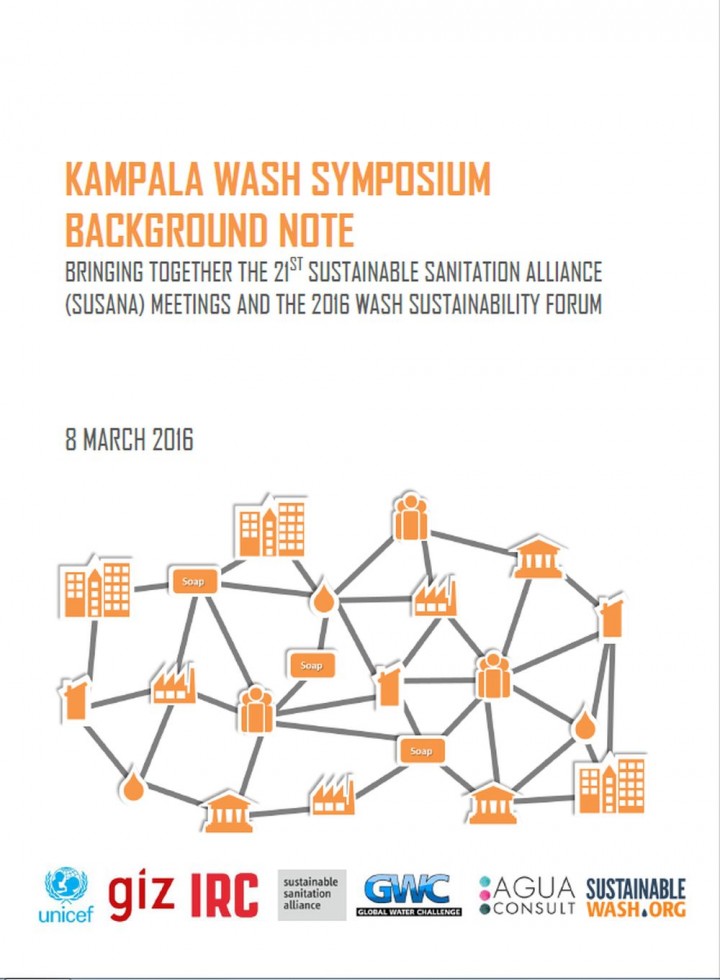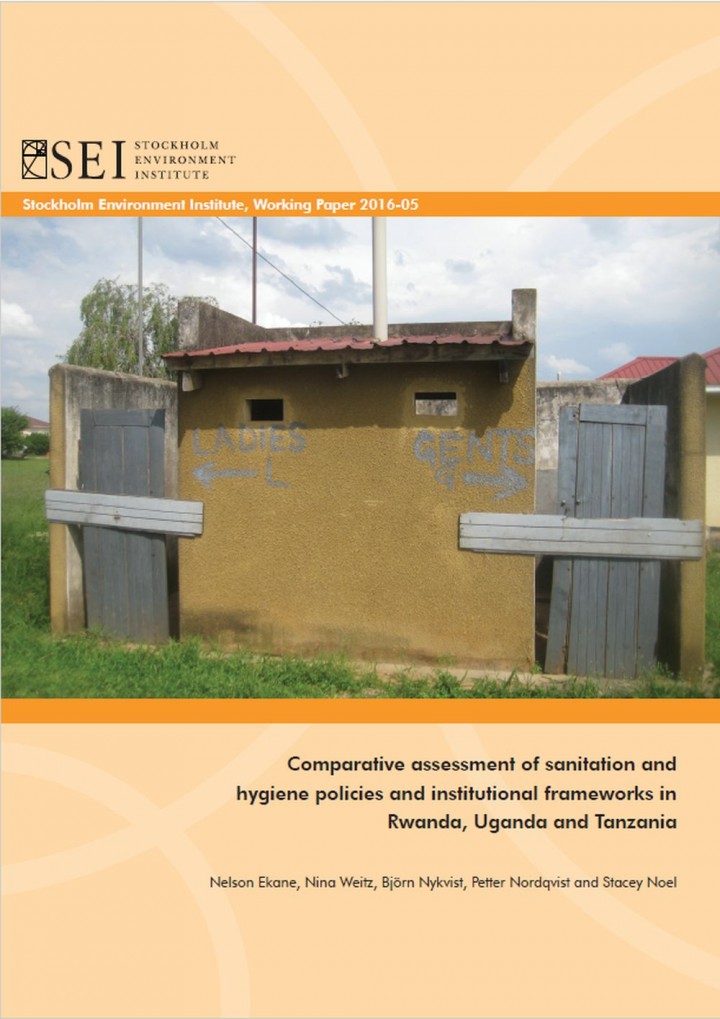Furlong, C. (2015) SFD Report (vn 2015) - Kisumu City, Kenya SFD Promotion Initiative
Kisumu is the principal city of western Kenya and the third largest city in Kenya. It covers an approximate area of 297 km2 and sits on the shores of Lake Victoria. The city is divided into two topographical areas, the hilly north and the southern plain. The current population is estimated to be 419,072 and 60% of the population live in informal settlements. A […]
Myers, J., Pasteur, K., Cavill, S. (2016) The Addis agreement: using CLTS in peri-urban and urban areas CLTS knowledge hub learning paper
The CLTS Knowledge Hub at the Institute of Development Studies, with the help of Plan International Ethiopia, convened a three day workshop in Addis Ababa. The workshop titled ‘Using a CLTS approach in peri-urban and urban environments’ brought together people who had been involved in urban CLTS programmes to share their varied experiences and discuss what added value a CLTS approach can bring to the […]
MoES, SAEMEO INNOTECH, GIZ (2016) Scaling-up the Fit for School program Sisattanak district experience
“The question now is not whether school health programs are necessary... but how they can be implemented at meaning scale. This is the challenge that we now face,” (Bundy, 2011, p. xiv). This quote reflects a key issue in the field of school health and WASH in Schools (WinS), especially in countries where resources are limited compared to the challenges in this field. Often good […]
Veses, O., Dinku, H., Evans, B., Peal, A. (2016) SFD Report - Bure, Ethiopia SFD Promotion Initiative
Bure is located 400 km north of the capital Addis Ababa and 148 km south west of Bahir Dar and is within the Amhara State, Western Gojjam Administrative Zone of Ethiopia. It has a total urban population of 27,386 people. The number of Open Defecation is only 2%. Nevertheless, none of the city's excreta is delivered to a treatment plant. Therefore, only 33% of the […]
Veses, O., Dinku, H., Evans, B., Peal, A. (2016) SFD Report - Bishoftu, Ethiopia SFD Promotion Initiative
Bishoftu is located in the state of Oromia, Ethiopia, approximately 47 km south east of Addis Ababa. Its topography is undulating and characterized by flat land on the north and east parts of the city, locked by several lakes, while the south is dominated by hills (BCP, 2015). The geographical area of the city is about 15,273 ha, and it lies at an altitude in […]
Veses, O., Dinku, H., Evans, B., Peal, A. (2016) SFD Report - Axum, Ethiopia SFD Promotion Initiative
Axum is located in the Tigray region in the northern tip of the Ethiopian Plateau. The town is 1,041km away from the capital, Addis Ababa, with a population of 46,887. The number of Open Defecation is only 4%. Nevertheless, none of the city's excreta is delivered to a treatment plant. Therefore, only 22% of the city's excreta is safely managed, while 78% is unsafely […]
Lockwood, H. et al. (2016) Kampala WASH symposium background note Bringing together the 21st Sustainable Sanitation Alliance (SuSanA) meetings and the 2016 WASH sustainability forum
To this end the Kampala WASH Symposium, held in Uganda in June 2016, looked beyond the conventional notion of ‘projects’ to explore how we, as WASH actors, can and should work together within the wider complex systems that deliver services. With participants and presentations from governments, donors, researchers, and practitioners, this event brought emerging thinking on how to drive whole-system change and support the […]
Hassib, Y., Etemadi, H. (2016) SFD Report - Kabul, Afghanistan
Kabul is the capital and largest city of Afghanistan, located in the eastern section of the country. According to a 2012 estimate, the population of the city was around 3,289,000. It was selected for the SFD program because it is a mega city with only 20% supplied with piped water and 60% informal dwellings. In Kabul it was estimated that 25% of excreta is managed […]
Gutterer, B., Reuter, S. (2016) Key elements for a new urban agenda Integrated management of urban waters and sanitation
Sustainable Development Goal (SDG) 6 “Ensure access to water and sanitation for all” and its targets can only be achieved by establishing new models for managing water resources. The fact that the Millennium Development Goal target for sanitation was not met in many countries shows the need to overcome traditional patterns of […]
Furlong, C. et al. (2016) How to prepare an excreta flow diagram (SFD) SFD Promotion Initiative, 39th WEDC conference, Kumasi, Ghana - July 2016
This presentation was held at the 39th WEDC conference in Kumasi, Ghana in July 2016 by the SFD Promotion Initiative. The objective of the session was to introduce the tools available for SFD production and to guide participants through the process of creating an SFD. The presentation contains information on: - The SFD Promotion Initiative - What is an SFD? - Methodology for data collection - Terms and variables: a […]
Furlong, C. (2016) SFD Report - Dhaka, Bangladesh SFD Promotion Initiative
Dhaka, the capital of Bangladesh, is one of world's most populated cities. ‘Dhaka City’ is defined in this report as the areas under the jurisdiction of the two Dhaka City Corporations. They cover an approximate area of 120 sq. km and house a population of 6.8 million people. The number of open defecators is low (less than 1%), but a majority of the city’s […]
Furlong, C. (2016) SFD Report - Lima, Peru SFD Promotion Initiative
Lima the capital of Peru and the third largest city in Latin America covering an area of 2,700 km2. Metropolitan Lima consists of the Province of Lima and the Constitutional Province of Callao and is located in a coastal desert. Approximately one third of Peru’s population live in Metropolitan Lima. It has an estimated population of 9,904,727. 92% of the excreta from the population of […]
Ekane, N. et al. (2016) Comparative assessment of sanitation and hygiene policies and institutional frameworks in Rwanda, Uganda and Tanzania
Policies are considered critical for creating an enabling environment for improving access to sanitation and hygiene services. There are, however, certain requirements that policies must meet for them to be coherent and supportive. This paper presents a comparative assessment of […]
Crocker, J. et al. (2016) Teachers and sanitation promotion An assessment of community- led total sanitation in Ethiopia
Community-led total sanitation (CLTS) is a participatory approach to addressing open defecation that has demonstrated success in previous studies, yet there is no research on how implementation arrangements and context change effectiveness. We used a quasi-experimental study design to compare two interventions in Ethiopia: conventional CLTS in which health workers and local leaders provided facilitation and an alternative approach in which teachers provided facilitation. In […]
Rognerud, I., Fonseca, C. (2016) Government investment in sanitation 2016 state of play
In May 2015, African leaders committed to budget allocations amounting to 0.5% of their countries’ respective Gross Domestic Product (GDP) to sanitation and hygiene by 2020. Specifically, this commitment was part of the Ngor Declaration adopted at the fourth African Conference on Sanitation and Hygiene (AfricaSan) by ministers responsible for sanitation and hygiene.1 This brief explores the context of this commitment: how much are governments […]
Awunyo-Akaba, Y. et al. (2016) Sanitation investments in Ghana An ethnographic investigation of the role of tenure security, land ownership and livelihoods
Ghana’s low investment in household sanitation is evident from the low rates of improved sanitation. This study analysed how land ownership, tenancy security and livelihood patterns are related to sanitation investments in three adjacent rural and peri-urban communities in a district close to Accra, Ghana’s capital.
SNV (2015) Reusso Sustainable Sanitation, Organic Solutions (year 2, Nº 3)
Safe access to water and sanitation is an issue of global concern and a challenge posed through national policy as a human right to achieve the benefit of these basic services for all Bolivians. Thanks to that approach, progress has been made significant achievements in increasing households today have improved their quality of life with water supply and sanitation services in their households. In spite of […]
SNV (2015) Reusso Sustainable Sanitation, Organic Solutions (year 1, Nº 2)
Promotion and dissemination of Decentralized Sustainable Sanitation represent a strategic line of knowledge management of “Decentralized Sustainable Sanitation NODE Project as a Knowledge and Impact Generation of Sustainable Solutions Platform”, implemented under a strong conviction to socialize experiences, share updated information and disseminate Ecological Sanitation values. The second issue of Reusso Magazine shares interviews and articles related with relevant aspects positioning Ecological Sanitation as a determinant and […]
SNV (2015) Reusso Sustainable Sanitation, Organic Solutions (year 1, Nº 1)
Reusso is a practical magazine that summarizes the knowledge and experience developed in ecological sanitation in various Bolivian institutions that make up the Decentralized Knowledge NODE on Sustainable Sanitation. It is a tool for the dissemination of Sustainable Sanitation Node Project as a Platform of Decentralized Knowledge Generation and Impact on Sustainable Solutions, funded by the Embassy of Sweden.
DSSP (2014) Experiencia en Plantas de Tratamientos Residuales Municipio Cliza, Cochabamba (in Spanish) Experience on wastewater treatment plants in Cliza municipality, Cochabamba
This paper systematizes the current situation and the experience of managing treatment plants wastewater in 6 localities of the municipality (Cliza, Retama, Ucureña, San Isidro, Retama, Surumi y Huasacalle) at Cochabamba, Bolivia. Through this systematization, the need is identified with a model of sustainable management ensuring the functioning of the sanitation system throughout the jurisdiction of the Municipality, allowing studying and generating guidelines for the […]




















